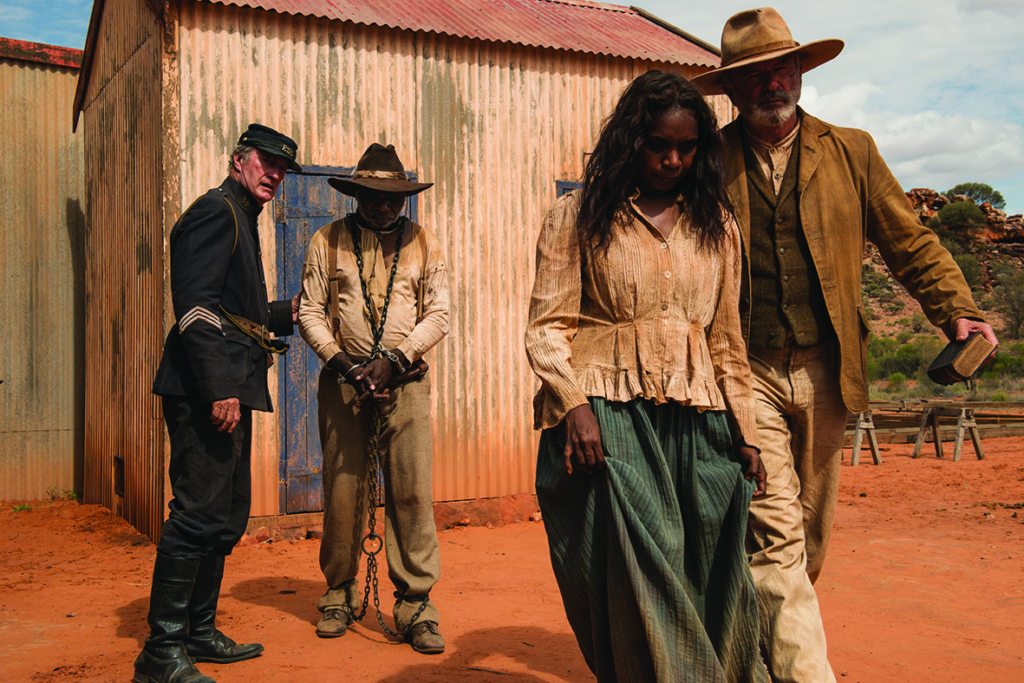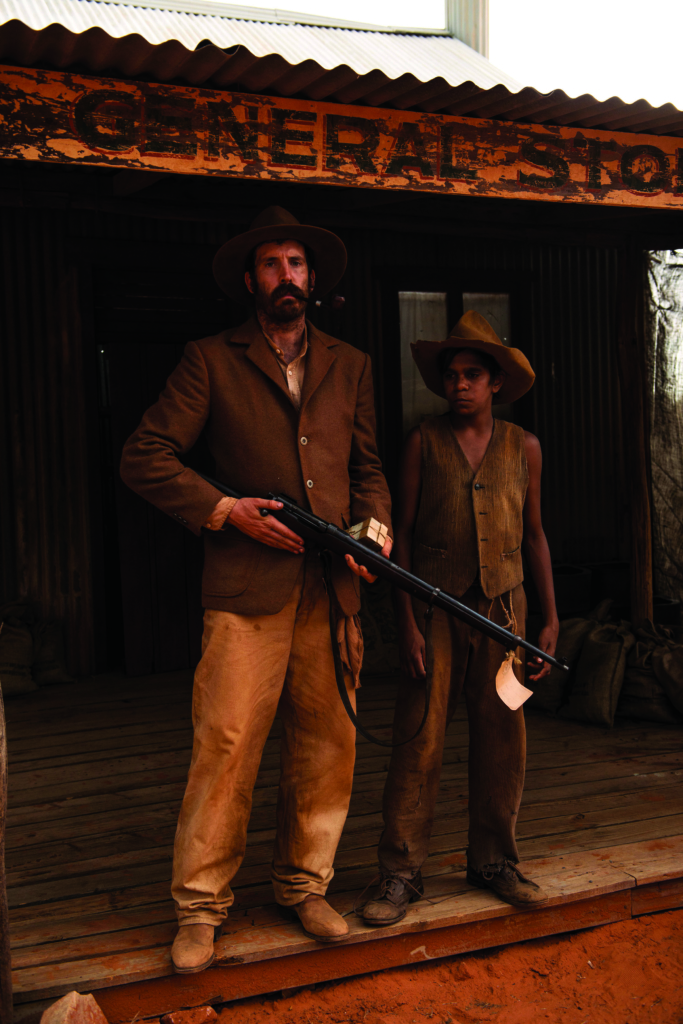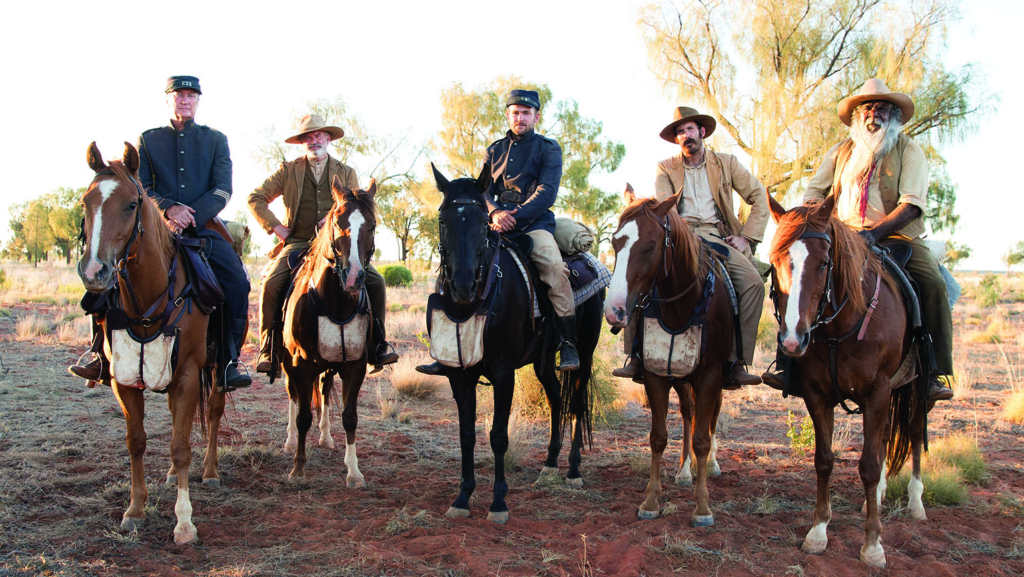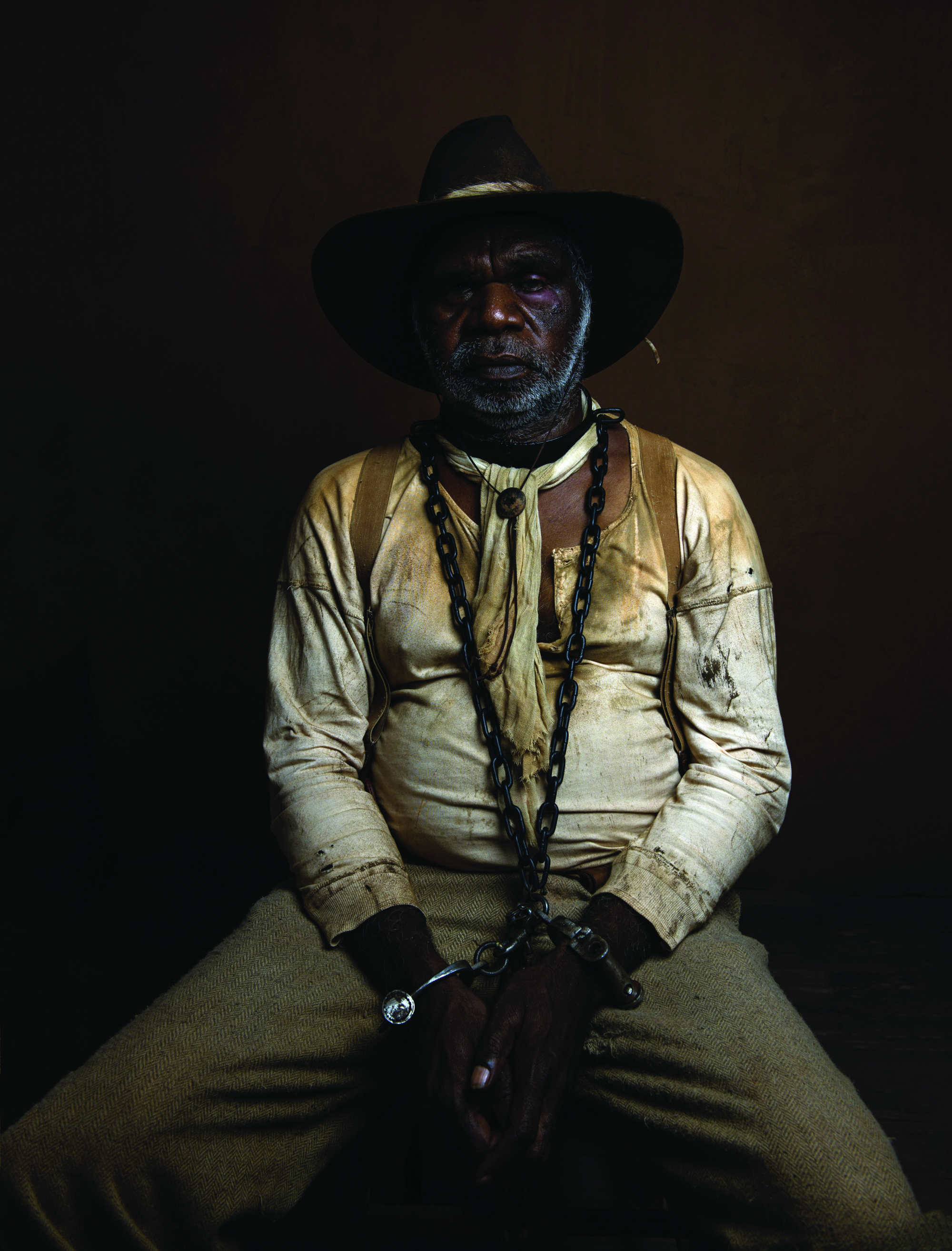Warwick Thornton attracted global accolades with his feature-film debut Samson & Delilah in 2009, and has been the subject of fevered anticipation ever since. In the intervening years, he has remained prolific in his work as a cinematographer (particularly for The Sapphires, Wayne Blair, 2012), documentary maker (especially We Don’t Need a Map, 2017), visual artist (Mother Courage, 2012), and fiction director (notably, the ‘Big World’ segment of the 2013 adaptation of Tim Winton’s anthology The Turning). While Thornton’s efforts in these various domains have been warmly received, the plaudits have not come close to the acclaim that saw the director win the Caméra d’Or at Cannes in 2009. And, if his 2013 episodic documentary–fiction hybrid The Darkside was too slight for critics and audiences to get a firm hold on, the rapturous applause that greeted Sweet Country at the 2017 Venice and Toronto film festivals have confirmed Thornton’s return to the global stage.
Sweet Country had its Australian premiere at last year’s Adelaide Film Festival (AFF), which previously supported The Darkside and Samson & Delilah via its investment fund. This latest work picks up where Thornton’s debut left off in its unflinching remit of highlighting the everyday injustices faced by Indigenous Australians. However, audiences expecting a return to the naturalistic realism of Samson & Delilah are in for an altogether-different experience with Sweet Country, as Thornton has calibrated his tenor to the decidedly more operatic scope of the western.

Whereas Samson & Delilah drew much of its power from the intimacy of its scale and its close proximity to its titular characters, Sweet Country widens its angle of view, employing a period setting and a broad cast of characters. The film begins with a close-up of a boiling billy, into which black tea and white sugar are poured, while racial abuse and a fight are heard but not seen. The film then cuts to Aboriginal man Sam Kelly (Hamilton Morris) on trial, being asked by presiding official Judge Taylor (Matt Day) whether he understands the charges being levelled against him. This question harks back to Thornton’s very first cinematic work, the short film Payback (1996) for SBS, which examines the essential incompatibility of black and white conceptions of justice.
Whereas Samson & Delilah drew much of its power from the intimacy of its scale and its close proximity to its titular characters, Sweet Country widens its angle of view, employing a period setting and a broad cast of characters.
Having established its essential thematic premise and central visual metaphors, Sweet Country then flashes back to the beginnings of the narrative proper: Sam is a stockman under the employ of Christian pastoralist Fred Smith (Sam Neill). The new occupant of an adjoining property, Harry March (Ewen Leslie), meets station owner Mick Kennedy (Thomas M Wright), and the two men bond over alcohol and tobacco, along with a shared prejudice against Mick’s Aboriginal station hands. Harry asks Mick if he can borrow his stockman Archie (Gibson John) and the young Philomac (played by twins Tremayne and Trevon Doolan) to work on his homestead.

Harry is a shell-shocked veteran of the World War I. Compounded by his alcoholism, his post-traumatic stress disorder manifests in violent, paranoiac outbursts, and his dangerous, unhinged sense of entitlement brings him into the orbit of Sam and his wife, Lizzie (Natassia Gorey-Furber), with tragic consequences. Suspecting Philomac of theft, Harry pursues the youth to Fred’s homestead, which Sam and Lizzie are minding while the landowner is in town. After a violent confrontation, Sam kills Harry in self-defence, an event that is witnessed by Philomac. In the aftermath, Sam and Lizzie go on the run, and Mick and police officer Sergeant Fletcher (Bryan Brown) form a posse to follow them, with Archie acting as tracker. A battle of wits plays out as Sam employs his superior knowledge of the harsh landscape of the MacDonnell Ranges to stay a step ahead of his pursuers.
Sweet Country has its origins in the true story of Wilaberta Jack, an Aboriginal stockman who went to trial in the Northern Territory in 1929 for the fatal shooting of Harry Henty – a white stockman who violently confronted Jack, accusing him of harbouring a runaway.[1]‘Wilberta Jack Acquitted of Murder of Harry Henty’, Northern Standard, 2 August 1929, <http://trove.nla.gov.au/newspaper/article/48029208#>, accessed 10 November 2017. Note: although this newspaper source spells the man’s first name as ‘Wilberta’ and David Tranter’s 2007 documentary uses the spelling ‘Willaberta’, Thornton himself has opted for ‘Wilaberta’; see ‘Director’s Statement’, in Transmission Films, Sweet Country press kit, 2017, p. 5. It is this last spelling that has been used here. This story was the subject of an eponymous 2007 documentary made for the ABC by Alice Springs–based filmmaker David Tranter, whose career as a sound recordist began with the ABC show Bush Mechanics and extends to the recent series Black Comedy, encompassing Thornton’s features Samson & Delilah and The Darkside. Tranter co-produced Sweet Country alongside Greer Simpkin and David Jowsey, and shares screenwriting credits herewith Redfern Now scribe Steven McGregor.

The film’s cast mixes established international stars like Neill and Brown with non-professional performers. The bearded stockman-turned-tracker Archie is played by first-time actor John, who became known to the production because of his excellent horseriding skills.[2]Warwick Thornton, in Sweet Country post-screening Q&A, Adelaide Film Festival, 8 October 2017. Hamilton Morris came to his star turn as Sam with a single acting credit to his name, a small role in the Alice Springs–set ABC sitcom 8MMM Aboriginal Radio. Thornton revealed at an AFF post-screening Q&A that Morris, being a Warlpiri man, was unable to speak the Arrernte dialect required for his character, and was coached by Arrernte-speaking non-professional co-star Gorey-Furber.[3]ibid. Meanwhile, the Doolan twins were spotted by Thornton at the Yipirinya School in Alice Springs; he was struck by the introverted qualities of one brother and the extroversion of the other, and thought this contrast would bring an interesting dynamic to the character of Philomac, who is at once the agent of chaos and the impartial observer of the ensuing events.[4]ibid. As with Samson & Delilah, Thornton is able to elicit performances of tremendous naturalism from his young and fledgling actors. Some of the most affecting moments in the film are those shared between Archie and Philomac during lulls in the drama. In one scene, the elder Aboriginal man, separated from his country and living in servitude to the violent Mick, warns his young counterpart about the dangers of living without culture and Dreaming lore, as Philomac finds himself falling under Kennedy’s insistence that he ‘gotta get away from all of that blackfella shit’.
Beyond such extraction from culture, Sweet Country is a film brimming with violence. After Harry is fatally shot, Thornton cuts to a close-up of the blood pumping from his neck in a lurid exploitation flourish. In another scene, a room is blacked out one window at a time, leaving only thin slits of light on the screen, while the horrors within play out on the soundtrack. An alcohol bottle discarded in the desert sand resonates with the threat of aggression, and words are brandished as weapons, with Kennedy repeatedly admonishing Philomac to ‘fuck off’. Even the landscape itself exudes a malevolent menace, as when Fletcher follows Sam out onto a salt flat: Thornton uses a subjective soundscape and shimmering visuals every bit as strange as those we see in Fata Morgana (Werner Herzog, 1971) to evoke Fletcher’s sunbaked state as he rides out slumped on his horse. This image simultaneously recalls the conclusion of Shane (George Stevens, 1953)and James Earle Fraser’s sculpture End of the Trail, itself the inspiration for a Beach Boys album cover.

By invoking such polyvalent images, Thornton is casting his work on a larger cinematic trajectory, engaging in a kind of archetypal shorthand. This is in contrast to the consciously self-contained world of Samson and Delilah. In Sweet Country, Thornton works on the level of allegory. He bypasses exposition by offering quick, wordless visual flashes that establish his characters, each of whom stands in for a particular character type or institution that will be familiar to viewers of westerns. Fred represents the Church, with his ardent yet misguided intent to bring ‘civilising’ morality to an occupied land. Taylor embodies another order of faith – that of the judicial process, which can see beyond prejudice and restore justice – while his opposite, Fletcher, is the savagely single-minded pursuer of natural justice, even if it takes him beyond the realms of the law. Archie, Sam and Philomac are Indigenous Australians at different stages of ‘assimilating’ into their subaltern positions within the new colonial order. Nell (Anni Finsterer), the hotelier and Fletcher’s romantic interest, represents the encroaching frontier of colonisation, keeping the home fires warm while the lawman plies his bloody trade in the outback. Harry emblematises the military apparatus of the same imperial project: the war veteran who returns with the acute instincts of the coloniser to seize, with impunity, that which he desires. And Lizzie is a case study of triple oppression – an Indigenous woman bearing witness to her own horrific circumstances as systemic disadvantage and dehumanisation rob her of her agency and her voice.
In Sweet Country’s grim irony, the same white settlers who cheer for Ned Kelly’s violent stand against the police become a Greek chorus of sorts, baying for Sam Kelly’s blood when he faces his day in court for the killing of Harry March.
There is a sense of dire inevitability as these characters march grimly like clockwork towards violent confrontation with one another. Thornton has acknowledged the schematic nature of the film’s narrative, stating that he intended to ‘use the accessibility of the western genre for audiences to enter the story and be drawn into this world and so experience the issues faced by an occupied people’.[5]Thornton, ‘Director’s Statement’, op. cit. Indeed, the western offers a narrative template that is readily adaptable to different ideological ends; New Hollywood westerns like Little Big Man (Arthur Penn, 1970) and Soldier Blue (Ralph Nelson, 1970) were widely interpreted as critiques of the American war in Vietnam, and western iconography inflects the historical Aboriginal narratives in Australian films The Chant of Jimmie Blacksmith (Fred Schepisi, 1978) and The Tracker (Rolf de Heer, 2002) – two thematic precursors to Sweet Country.

In his visual reference points, Thornton looks back further. Working once again as his own cinematographer, Thornton this time eschews Samson & Delilah’s close, mobile shot scale.Instead, Sweet Country’s restrained camera movement and careful widescreen compositions of vast landscapes evoke the epic sweep and grandeur of classic westerns like The Man from Laramie (Anthony Mann, 1955), River of No Return (Otto Preminger, 1954) and The Searchers (John Ford, 1956). But Thornton also incorporates a more sophisticated form of self-critique in his pursuit of contemporary resonance by adding a scene that did not originally appear in Tranter and McGregor’s screenplay[6]Thornton, Sweet Country post-screening Q&A, op. cit. – one in which Fletcher stumbles into a raucous, hand-cranked outdoor screening of The Story of the Kelly Gang (Charles Tait, 1906). This intertextual reference connects Sweet Country to a filmic lineage that extends from the origins of cinema in this country through to the portrayals of Ned Kelly by Mick Jagger (Ned Kelly, Tony Richardson, 1970), Yahoo Serious (Reckless Kelly, Serious,1993) and Heath Ledger (Ned Kelly, Gregor Jordan,2003), each performance consolidating the eponymous figure’s status as an outlaw hero in the mainstream national consciousness. In a similar way, Thornton’s We Don’t Need a Map surveys the symbology of the Southern Cross from Indigenous cultures to the Eureka Stockade, and its reappropriation as a nationalist anti-immigration symbol in the wake of the Cronulla Riots and the Australia First Party. In Sweet Country’s grim irony, the same white settlers who cheer for Ned Kelly’s violent stand against the police become a Greek chorus of sorts, baying for Sam Kelly’s blood when he faces his day in court for the killing of Harry March.
Like The Hateful Eight (Quentin Tarantino, 2015), Sweet Country employs western archetypes to level an uncomfortable critique of contemporary affairs; in their brutal conclusions, both films ultimately suggest the impossibility of racial harmony, although the ambiguous final image of the latter offers a slim hope that another way may be possible. Nevertheless, the end credits play out to Johnny Cash’s ‘Peace in the Valley’, a sardonic rejoinder to the bloodshed that has preceded it, implying that the only peace the characters will know in this land is in the sleep of death. Sweet Country’s title has no doubt taken on greater significance following the film’s commercial release on the eve of Australia Day 2018. Amid debate as to whether or not this commemorative date should be moved, or the holiday abolished altogether, Thornton’s excoriating film implicates all of us. As Thornton asserted at AFF, ‘This is our story, Australia’s story.’[7]ibid. Sweet Country suggests that individual decency and noble intentions count for little; the bloody legacy of colonialism comes back to wound everyone in the end.
Endnotes
| 1 | ‘Wilberta Jack Acquitted of Murder of Harry Henty’, Northern Standard, 2 August 1929, <http://trove.nla.gov.au/newspaper/article/48029208#>, accessed 10 November 2017. Note: although this newspaper source spells the man’s first name as ‘Wilberta’ and David Tranter’s 2007 documentary uses the spelling ‘Willaberta’, Thornton himself has opted for ‘Wilaberta’; see ‘Director’s Statement’, in Transmission Films, Sweet Country press kit, 2017, p. 5. It is this last spelling that has been used here. |
|---|---|
| 2 | Warwick Thornton, in Sweet Country post-screening Q&A, Adelaide Film Festival, 8 October 2017. |
| 3 | ibid. |
| 4 | ibid. |
| 5 | Thornton, ‘Director’s Statement’, op. cit. |
| 6 | Thornton, Sweet Country post-screening Q&A, op. cit. |
| 7 | ibid. |





